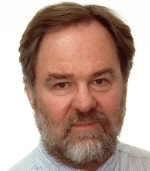 (HOST) The earthquake in Haiti has reminded commentator David Moats of something he learned during another earthquake – 21 years ago.
(HOST) The earthquake in Haiti has reminded commentator David Moats of something he learned during another earthquake – 21 years ago.
(MOATS) I happened to be in San Francisco when the big earthquake hit in 1989, and one of my lasting memories is of what went through my mind while the building shook, and shook, and shook.
This all comes back to me because of the epic destruction from the quake in Haiti.
I was on the third floor of the San Francisco Chronicle building, and moments after we felt the jolt I was under a desk. There was a huge rumbling noise, and the whole building shook as if gripped by a giant hand. I still have a piece of the ceiling tile that fell onto the desk above me.
What I remember most vividly, however, is the visual imagery that flashed through my mind as the quake continued. The tremors were so massive I pictured the entire building crumbling – and me on the third floor going down with it.
But I didn’t picture getting injured or killed. My mind brought forth the image of me standing up amid the rubble, a survivor. This was not a conscious decision to be optimistic. This image was not something I willed. It came from somewhere inside me. It was an unreasoning, instinctive response.
People talk about the will to live. The power to imagine survival, even in the midst of a 7.0 earthquake, may be what they mean. If so, the will to live is imbedded deep within us. It was powerful enough to overcome – or maybe to answer – the fear I was feeling, which was all too real. This power to imagine survival must be the origin of what we call hope. The irrational power of hope has probably allowed us to survive as a species.
Amid all the devastation in Haiti or other natural disasters, news reporters always find stories of miraculous survival – of people trapped for days and the heroic efforts to save them. Years ago there was that infant who survived alone in the rubble of Mexico City for ten days. These stories aren’t just the feel-good reporting of silver-lining optimism. They’re an exercise of our power to hope. How can you not look for those stories as you’re reporting the death and destruction all around you?
We’ve been taught about the three virtues – faith, hope and love – and in recent years scientists have been wondering if there’s a faith gene or an altruism gene. If there is, I bet there’s also a hope gene.
These three virtues are more than standards of behavior to which we should aspire. They’re also a way to describe the workings of our inner selves.
Hope allows us to imagine our own survival and the survival of others, against the odds. It’s what makes us not give up, even when the world is falling down around us.
People from all over the world are rushing to help in Haiti in response to the power of hope.
How could we live without it?